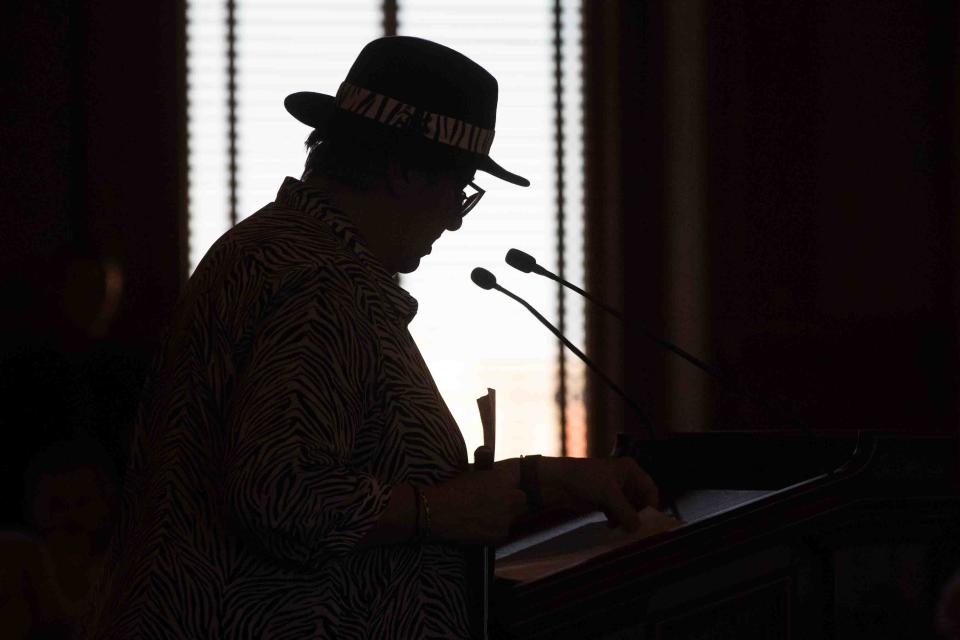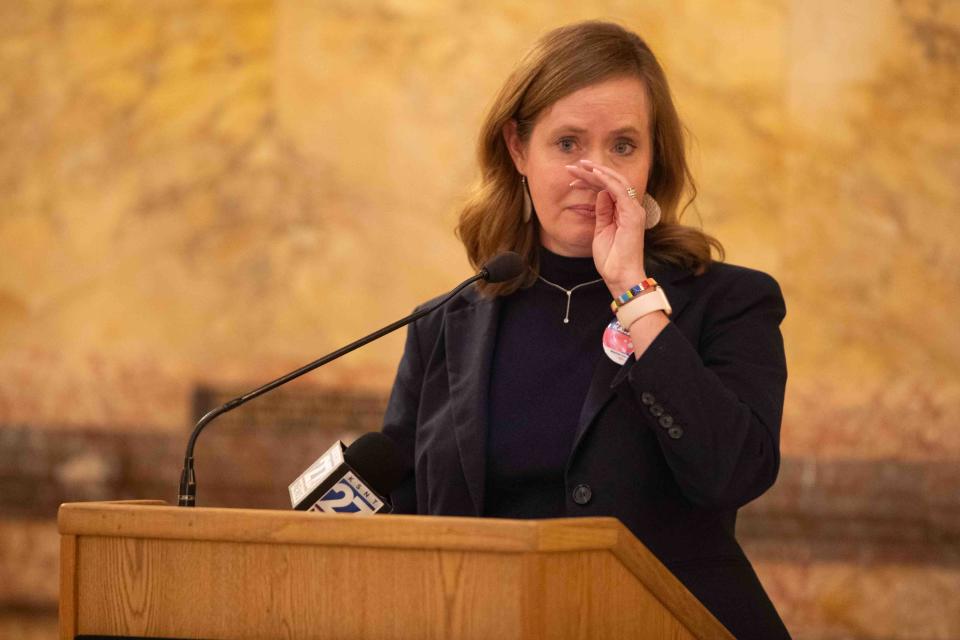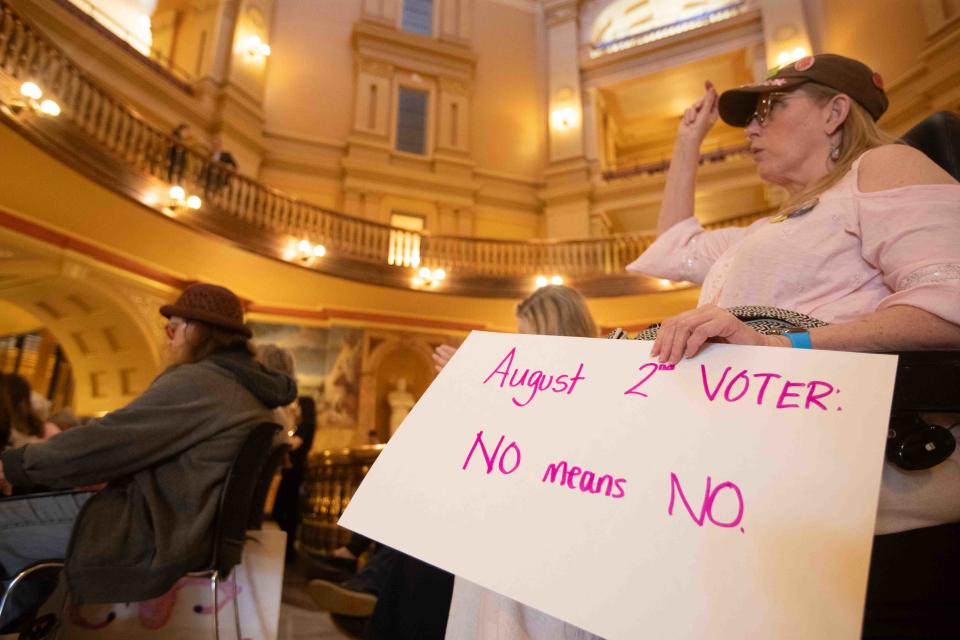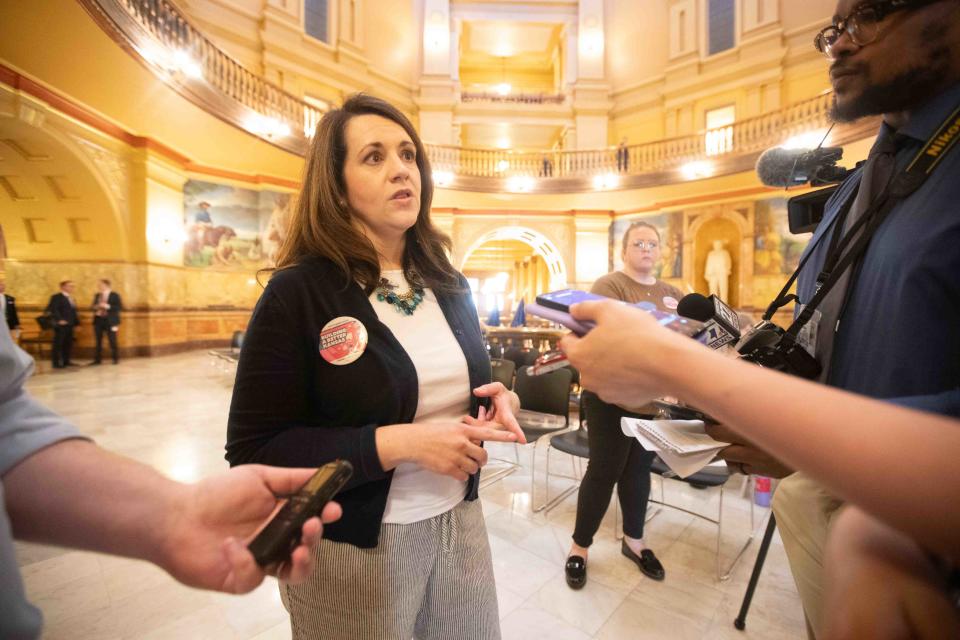What did Kansas voters mean when they rejected anti-abortion amendment? Lawmakers disagree
Kansas lawmakers disagree on the meaning of the message that voters sent when they resoundingly rejected an anti-abortion constitutional amendment.
Despite voters overwhelmingly rejecting the Value Them Both Amendment on Aug. 2, 2022, Republican legislators enacted new laws on abortion over opposition from Democrats and vetoes by Gov. Laura Kelly.
"It is unfortunate that some in the Legislature remain committed to undermining the will of Kansans, who overwhelmingly voted on August 2, 2022, against politicians interfering in these private medical decisions," Kelly said in a statement after supermajorities overrode her four abortion-related vetoes.
"By continuously finding ways to raise the issue and attempting to subvert the will of Kansans, these legislators are not representing the vast majority of those who elected them to office. If they were truly representing or even listening to their constituents, bills like these wouldn't have made it to my desk after such a resounding rebuke of political overreach."
Republicans see it differently, rejecting the idea that the vote meant Kansans spoke against any kind of abortion-related legislation.
"This has been blown out of proportion as far as the whole using the phrasing of 'Kansas spoke,'" said Rep. Rebecca Schmoe, R-Ottawa, in a House GOP meeting on a bill to criminalize coercing an abortion. "All of us understand that when Kansas spoke, they did not in any way, shape or form condone the threatening of the life, livelihood or legal documentation of women. No one spoke to that was OK."

Rep. Brenda Landwehr, R-Wichita, expressed a similar sentiment in the same caucus meeting when discussing a bill on heightened reporting by abortion clinics.
"I know that the conversation for the veto override still goes back to people have spoken," Landwehr said. "And it's like we heard from the previous representative, the people did not speak on anything except abortion being what it is today in Kansas. We've always had abortion reporting that happens over at KDHE."
Emily Wales, president and CEO of Planned Parenthood Great Plains Votes, balked at the notion that Kansans didn't speak against abortion legislation.
"Putting it to the voters, choosing the date and writing the language were all done by Republicans who are under this dome," Wales said. "They chose that fight, they chose the time and they chose the language at every opportunity.
"What they heard instead was politicians don't belong in the provider's room, they don't belong in the doctor's office and you should stay out of it. And they are not able to do that, apparently."
Kansas voters rejected anti-abortion constitutional amendment in 2022
The Value Them Both Amendment, so named by supporters who contended it would support both mothers and babies, was an attempt by anti-abortion lobbyists and lawmakers to undo a 2019 ruling by the Kansas Supreme Court.
In that 2019 Hodes decision, the justices found that the Kansas Constitution protects bodily autonomy and therefore protects abortion rights. Even after the U.S. Supreme Court's Dobbs decision overturned federal abortion protections in Roe v. Wade, the Kansas ruling has been used to challenge some, but not all, of the state's restrictions on abortion.
The proposed constitutional amendment would have stripped the right to an abortion while guaranteed the Legislature had full authority to regulate the procedure as lawmakers saw fit — potentially including a ban. But voters rejected it in a 59% to 41% vote during the August 2022 primary election.
Democrats and supporters of abortion rights view that as a referendum against any legislation on abortion.
"Kansans thought that we put that to bed, and I wish we had — but we haven't," said Senate Minority Leader Dinah Sykes, D-Lenexa, speaking through tears at a Statehouse abortion rights rally during veto session.

But Republicans and opponents of abortion view the vote more narrowly, such as a rejection of tougher restrictions than there are currently, or rejection of a total ban. They argue that their new laws don't add new restrictions.
One law makes it a crime to coerce a pregnant person to get an abortion. Another law adds to the existing reporting requirements for abortion clinics. A different law creates tax benefits for anti-abortion counseling centers, and the state budget gives $2 million in taxpayer money to those organizations.
"We did ask for additional reporting, but nothing that restricts or causes a woman not to have access or the ability to abortion," Landwehr said.
She said the goal is to get more data.
Trying to overturn Hodes? Kansas again spends taxpayer money on anti-abortion efforts, despite not having reports
"I think we need to know why it is that women are having abortions so that we can help them," Landwehr said. "If they want to carry that baby to term, that we make sure that they have access to any services that they can."
House Minority Leader Vic Miller, D-Topeka, quoted Landwehr saying in a committee meeting that legislators want the data to "make sure we're making the right decision for these women."
"On Aug. 2, 2022, men and women across this state said that we (lawmakers) are not the ones to be making this decision for women," Miller said. "They are the ones that should be making the decision."

When testifying before lawmakers in February, Lucrecia Nold, of the Kansas Catholic Conference, said she recognized that there are differences of opinions on the broader issue of abortion. But she suggested there should be agreement on providing material support to vulnerable pregnant women and girls through the counseling centers, which are also known as pregnancy resource centers.
"I would hope that even with our different opinions that we can all acknowledge and agree that if women are freely going to choose, and that they're choosing life, that we should be able to provide the support and care that these women need," Nold said. "That's what these pregnancy resource centers and maternity homes do."
Are Republicans trying to overturn Hodes decision?
Wales, of Planned Parenthood, said she believes legislators are working to overturn the 2019 Hodes decision.
"It's interesting that the Legislature isn't going to come out and say that, because what they saw in 2022 was affirmation from voters," Wales said. "Turns out the Kansas Supreme Court had it exactly right. They were right about the law, but also they were right about where Kansans are in wanting to protect bodily autonomy. But I think that's functionally what they're trying to do, they're trying to chip away at what is now established law."
Wales said the election results were overwhelming.
"It was 19 points," she said. "It was a huge outcry for reproductive rights. But I think if you (lawmakers) can try to chip away and not be honest about what you're doing, that's what we're seeing here."

Democrats have suggested that a bill on providing child support before a baby is born could be part of a bigger strategy for overturning that 2019 court decision.
Sen. Ethan Corson, D-Fairway, said the bill initially "seems rather innocuous," but likely would have broader implications because of fetal personhood.
"If we're going to say that fetuses now have legal rights, that is going to affect downstream a whole bunch of other things," he said.
He pointed to an Alabama Supreme Court decision that frozen embryos created through in vitro fertilization were considered children under a state law — a law that Corson said was similar to the Kansas bill. That Alabama ruling led to providers no longer offering IVF in Alabama until the state passed a new law.
Earlier in the session, Senate Republicans blocked a bill to protect IVF in Kansas.
"Fetal personhood, that is not what this bill is about," said Sen. Kellie Warren, R-Leawood.
Kansas already has such laws on the books. Warren read from some, including one declaring the life begins at fertilization, calling it "a settled issue."
Because Republicans didn't pass the child support bill until veto session and the Legislature has since adjourned, they now won't have an opportunity to override a likely veto.
Debate over the anti-coercion bill also had implications for the Hodes decision.
House Republicans and Democrats initially agreed to make the bill also apply to coercion in other reproductive health situations, such as coercing someone to get or stay pregnant. Rep. Jo Ella Hoye, D-Lenexa, called it "a really good idea, because it is wrong to coerce people into making decisions about pregnancy outcomes."
But she and other Democrats took issue with the final bill because Republicans reverted back to the original version that only applied to abortion. The explanation was that the bill, by recognizing bodily autonomy rights in all reproductive health situation, would make it harder to undo the court decision.
Schmoe, the Ottawa Republican, told a meeting of House Republicans, "We were basically going to be codifying Hodes, because it turns from abortion coercion into all reproductive coercion."
Landwehr, the Wichita Republican, indicated that she views the new reporting law as complying with current court precedent — but that she wants the decision reversed.
"If this was restricting (abortion), I could understand the debate," Landwehr said. "I think there's a lot of misinformation out there, because I know I've gotten the same emails that some of you have, that say 'The people spoke when they voted down Value Them Both.'
"OK, the vote happened, it went down, and until that can be changed sometime in the future, we accept it and we operate within those parameters. The people didn't spoke about not wanting to be more informed or be more educated."
Earlier in the session, several Senate Republicans joined with Democrats to block a near-total ban on abortion from being advanced.
“Sometimes allies in the war disagree on battle tactics," said Sen. Mike Thompson, R-Shawnee, who said he has explained to allies "why hearing this bill would be detrimental to achieving our mutual goal of overturning the Hodes decision and protecting life in Kansas."
Jason Alatidd is a Statehouse reporter for The Topeka Capital-Journal. He can be reached by email at jalatidd@gannett.com. Follow him on X @Jason_Alatidd.
This article originally appeared on Topeka Capital-Journal: Kansas Republicans tire of hearing voters spoke against abortion laws

